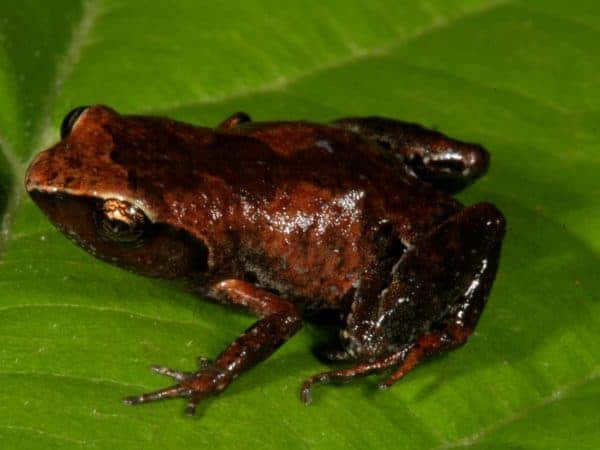Tiny frog in Zimbabwe comes back from the dead

 If animals coming back from the dead have freaked you out since “Pet Cemetary”, read no further.
If animals coming back from the dead have freaked you out since “Pet Cemetary”, read no further.
A tiny dark red frog nicknamed the “cave squeaker” has been re-discovered in the mountains of Zimbabwe after 54 years of being considered effectively wiped off the evolutionary map.
Arthroleptis troglodytes is at this point confined to a small region in Zimbabwe’s Western Chimanimani Mountains, but its re-emergence is cause for celebration among zoologists and conservationists worldwide.
“These sorts of things are always good news, because there’s so much bad news in the realm of amphibians right now,” says Joe Mendelson, director of research at Zoo Atlanta, to the Christian Science Monitor.
There are more than 5,000 known frog and toad species living in almost all habitats and regions throughout the world, but as creatures of both land and water, frogs, toads and amphibians in general are extremely sensitive to ecological disruption and are considered bio-indicators of environmental change.
Thus, charting the rise and fall of amphibians is a useful indicator of the health of ecosystems in relation to problems such as deforestation, human development and climate change.
In the case of the cave squeaker, which as its name indicates makes its home in caves but also in sink holes and under rocks in open grassland, the frog was first identified and collected in 1962 but had not been seen since, with only a reported 16 known specimens in collections around the world.
Frog comes back from the dead…sorta
Researchers had pretty much given up on finding A. troglodytes, according to Dr. Robert Hopkins, research associate at the Natural History Museum in Bulawayo, Zimbabwe, who had himself been searching for the little frog for decades.
“I had said that I had been looking for this species since 1998, without success, but wanted to try again at the end of 2016,” says Hopkins in a report on the finding. Hopkins, who due to a cancer diagnosis was unable to participate in the excursion, was informed by a colleague on December 2, 2016, that the research team had found and photographed three male and one female cave squeakers at the summit of Chimanimani.
“At 1730hrs I received a call from a very excited François Becker saying he had located an Arthroleptis troglodytes. It was great surprise and release after all these years,” says Hopkins. “These photographs are the only photographs of these frogs in the world, and belong to the people of Zimbabwe, and to National Parks in particular.”
Hopkins states that although the research data indicates that the cave squeaker species is “alive and well” in a seemingly “very viable population,” he nonetheless cautions that care must be taken to allow the species to flourish on its own, without human interference. “My greatest concern now is that the scientific world will flood in to capture and illegally export specimens from Chimanimani,” says Hopkins, “and I ask the National Parks to be vigilant to this threat.”
The International Union for the Conservation of Nature and Natural Resources (IUCN) states that at least 1,856 species of amphibians around the world are considered threatened with extinction, representing 32 per cent of all known amphibian species.
The Canadian government’s List of Wildlife Species at Risk includes eight amphibians listed as endangered and five as threatened. At this point, the Great Lakes population of the tiger salamander is the only amphibian subspecies to be listed as extinct.

